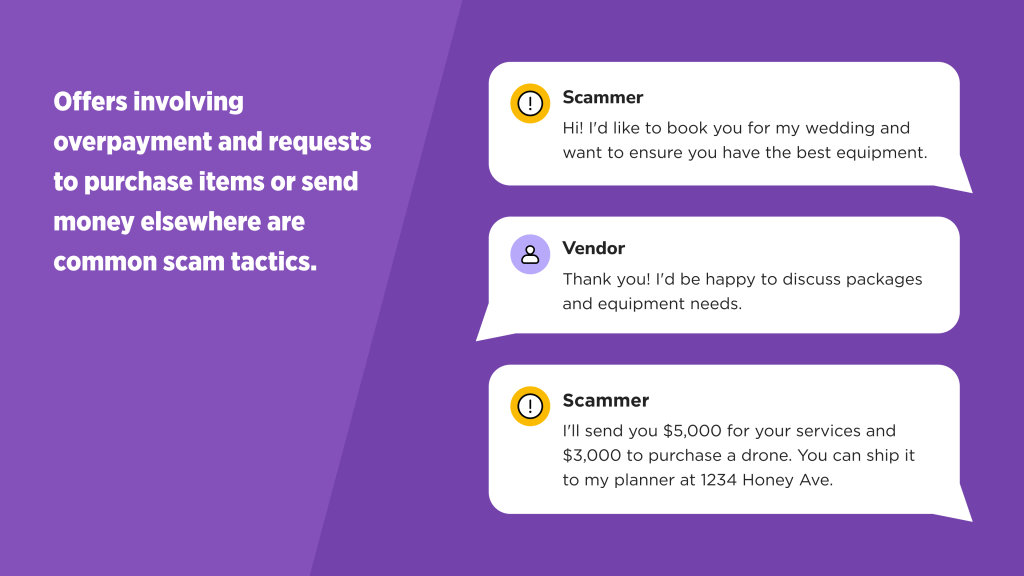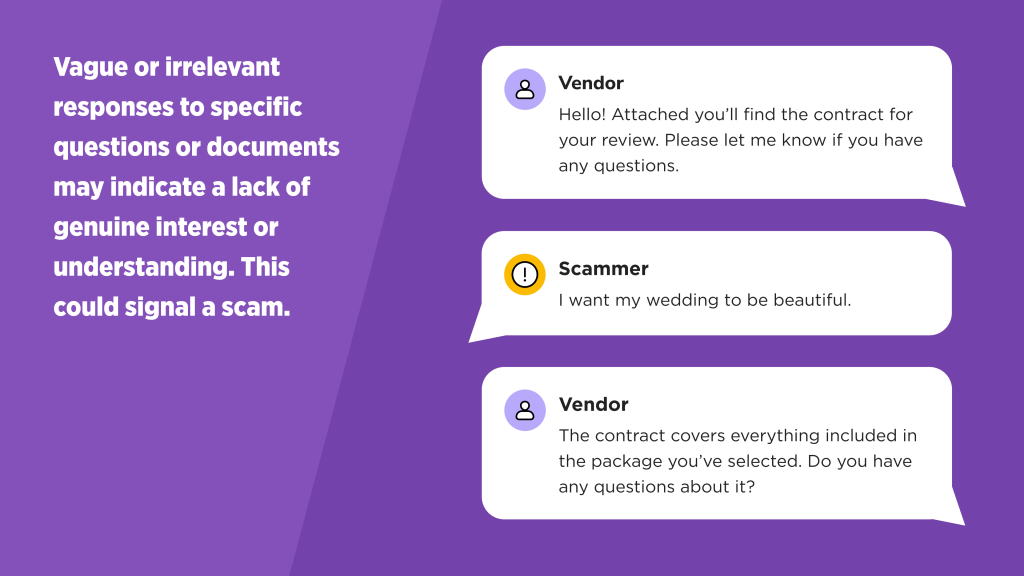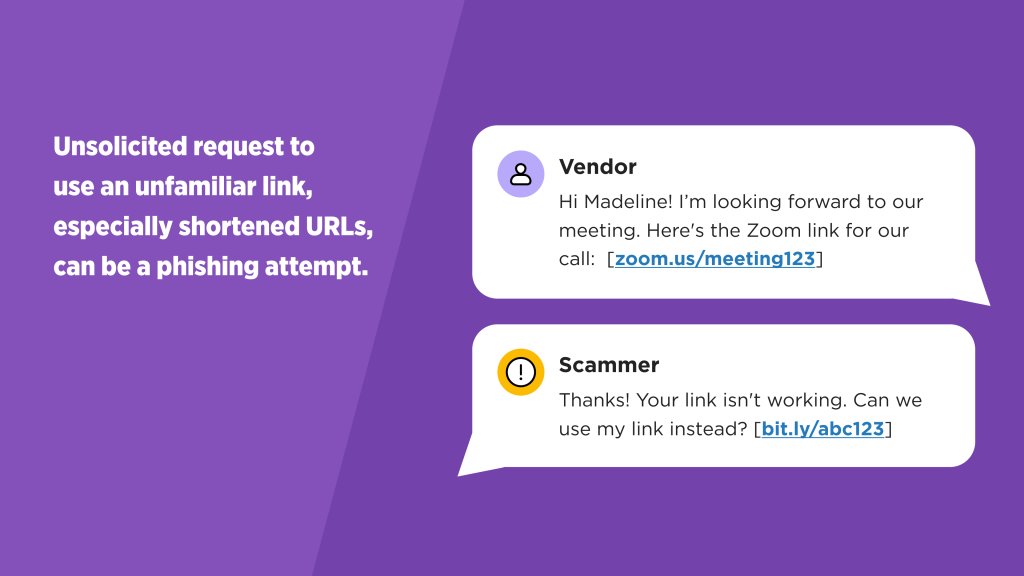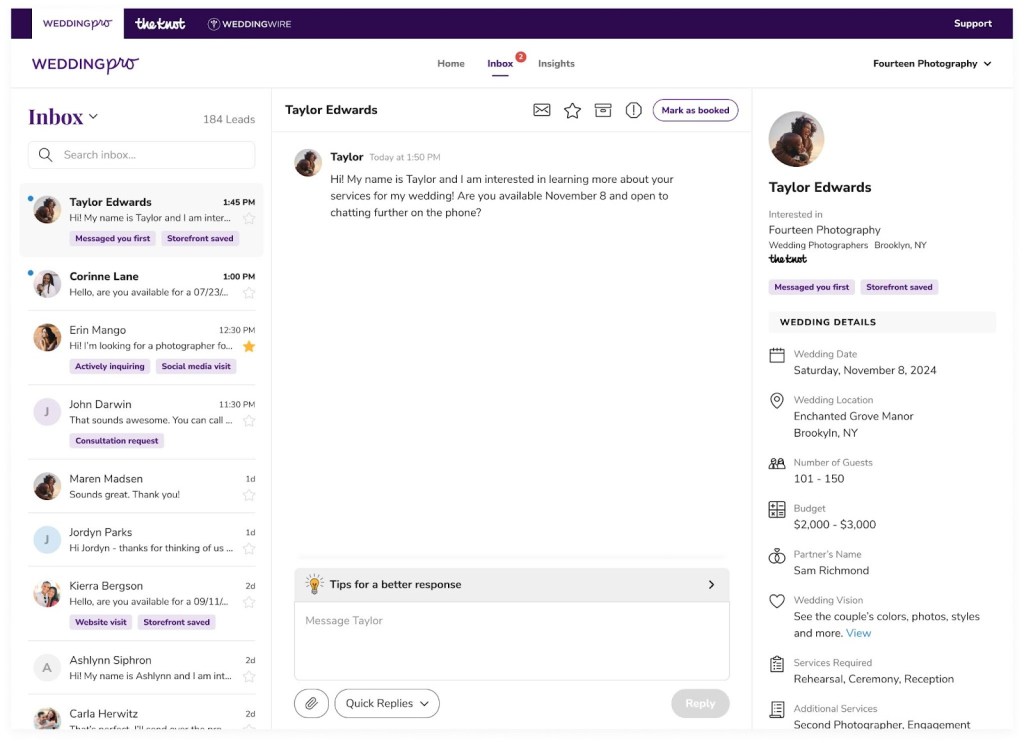How to Protect Your Wedding Business from Online Scams and Spam

The internet is an incredible place for connecting with couples and getting your business out there. But, like any lively community, you might find a few bad actors. Since the dawn of the worldwide web, third-party scams and spam messages have filled inboxes across the web—from messaging boards like Craigslist to dating apps like Hinge.
Why does spam happen? What’s in it for these bad actors? And most importantly, how can you protect yourself? We dove into these questions with Alastair Surin, Senior Director of Engineering at The Knot Worldwide, to arm you with the tools to stay safe.
What is spam?
In simple terms, spam is unsolicited, irrelevant and/or inappropriate messages that are mostly sent in bulk. Spam comes in many forms and is sent for many reasons, often to gain access to your data or your finances.
If you get spam in your email, social media DMs or even your messages on wedding marketplaces, you aren’t the only one. Unfortunately, everyone on the internet is susceptible.
In the early days of the internet, spam looked like low-effort schemes aimed at stealing—think princes you’ve never heard of emailing for your banking info. Today, with the rise of AI, these messages have become more sophisticated and convincing, using publicly available information and often preying on our trust and kindness. But don’t worry—we’re here to help you spot the red flags and avoid the traps.
Spam vs scams explained
Because spam and scams are often interlinked, it’s hard to know what the difference is. Essentially, spam is a tool in a scammer’s toolkit. They use spam to connect with and deceive you as part of their scams.
The scam itself is usually a fraudulent scheme used explicitly to deceive people into giving out personal information, access to sensitive data or money.
Why do scammers target wedding vendors?
Wedding vendors rely on personal connections to grow their businesses. Those connections today start online, often by providing their contact information publicly, making vendors prime targets for spam messages and the scams that come with them.
Fraudsters can exploit this by posing as excited couples or would-be clients with the goal of getting wedding vendors to invest their time, creating a genuine connection that they can then weaponize.
Ever heard of the sunk-cost fallacy? It’s the idea that the more time or energy we invest in something, the harder it becomes to walk away—even when it’s clearly not working. That’s why some spam messages are hard to let go, especially after you’ve exchanged a ton of messages. And scammers take advantage of this psychology.
Here are the most common ways scammers target wedding vendors:

Phishing and scams
Targeting financial information: Spammers might pose as clients to get financial details or personal information from vendors.
Identity theft: Some spammers try to collect personal, business or bank information to use it maliciously.

Unsolicited advertising and disruption
Promoting irrelevant services: Some spammers aren’t after your data—they just want to promote their own services. These messages might look like inquiries but are actually advertisements from other vendors or unrelated businesses. These schemes turn your inbox into a mini trade show you never signed up for.
Disruption: Some individuals spam wedding vendors simply to waste their time or disrupt their business operations. Seems totally pointless, right? But a troll’s gonna troll.

Fraudulent inquiries to collect data
Harvesting information: Spammers may use fake inquiries to collect contact details such as email addresses or phone numbers. They then use this information to sell or reuse in other spam campaigns.
Testing responses: Some scammers send fake inquiries just to see how you respond. They use this information to fine-tune their tactics for future scams. It’s important to stay cautious.
For example, they might ask for copies of contracts, bank account details for payments, ask to send you a check, or for your personal home address under the guise of “booking” or “confirming your business details.” These are things you shouldn’t share right away—only share what’s necessary until you’re confident the lead is genuine.
Automated spam and bots
Lack of targeting: Many spammers now use automated bots to send messages to broad groups, without distinguishing between wedding vendors and other businesses. You might see these scammers miscategorize you by asking about “your venue” when you’re a photographer.
Form exploitation: Bots exploit online inquiry forms on vendor websites to send spam messages indiscriminately. We have a couple of tips for you to follow to avoid this kind of spam, as it is one of the most popular forms of scamming.
How do I spot spam?
Spam often looks increasingly realistic, so you should have your guard up. If something feels off, trust your instincts and double-check before investing more time.
Here are some tell-tale signs of spam messages:
- Bot-like language: Messages may feel disjointed, overly generic or slightly off-tone.
- Extreme generosity: In some cases, you might receive overly generous offerings from couples.
- Irrelevant details: The inquiry doesn’t align with your business. For example, requesting catering or asking about florals when you’re a photographer.
- Non-sequitors: The response from the lead doesn’t address your most recent messages. For example, you send a contract, and the client responds, “I want my wedding to be beautiful.”
- Repetitive content: You notice the same message popping up across different platforms. For example, you receive the same message via email and in a DM on Instagram.
- Undue urgency: Scammers use urgency to keep you engaged. And when you feel rushed, it’s easier to overlook the red flags.
How to protect yourself against spam messages
- Educate staff: Train teams or collaborators to recognize any suspicious messages.
- Keep it on WeddingPro: When you leverage your WeddingPro Inbox to manage client messages, we have greater visibility and can help identify suspicious messages or links for you. Remember to mark any suspicious messages as spam, so that we can help investigate and continue to enhance our spam filters for you.
- Limit information sharing: Avoid publishing unnecessary personal details on public platforms such as personal phone numbers, home addresses, payment info or even behind-the-scenes details that could be used for social engineering (like family members’ names, kids’ schools, or personal travel plans).
- Monitor payment methods: Be cautious with payments, particularly involving checks, wire transfers or links.
- Triple-check links: Don’t click on links sent by couples until you are sure they are legit. This can be as innocent seeming as a wedding website, Zoom or Microsoft Teams link. Hover over the link to see where it leads, and if it doesn’t match what you expect, don’t click.
- Use filters and CAPTCHAs: Implement spam filters and CAPTCHA systems on inquiry forms on your website to reduce automated spam.
- Verify clients: Double-check the legitimacy of new inquiries. As we mentioned earlier, keep an eye on couples who are especially vague or have overly generous offers, as well as clients who have a sense of urgency or push you to go off the platform.
How WeddingPro works to prevent spam
At WeddingPro, our team is always working to keep scammers at bay. IHere’s how we actively work to protect your business:
- A dedicated team: We have a specialized team committed to identifying, analyzing and responding to suspicious activity across the platform. This team monitors traffic patterns, messaging behavior and user reports in real time to stay ahead of evolving threats.
- Pattern recognition & IP monitoring: Using industry-standard tools, we track suspicious trends—like bulk messaging from unusual IP addresses or repeated outreach patterns—to flag bad actors early.
- Firewalls & bot protection: Our web application firewall helps screen out automated traffic and basic bots. While scams have become more sophisticated—often mimicking real human conversations—we’re continuously updating our defenses to catch even the most deceptive attempts.
- Proactive spam detection: Whether it’s a fake drone purchase offer or a phony payment scheme, we’re constantly reviewing flagged conversations. Our systems and team look for telltale signs of scams, such as suspicious numbers of messages, suspicious locations, urgency tactics or requests to move conversations off-platform, which often signal malicious intent.
- Handling vendor reports: We take your reports seriously. When vendors report suspicious leads—especially with context—our team can immediately investigate and block further outreach. Reports that include notes (e.g., “they asked me to switch to another Zoom link” or “they wanted to pay via Western Union”) help us act faster and prevent harm to others.
- Ongoing improvements: We’re actively building out new tools and processes to prevent potentially dangerous messages. This is part of a broader effort to keep communication safe and trustworthy on WeddingPro.
While spam may never fully disappear from the internet, our goal is to make WeddingPro a secure and reliable place for vendors to connect with real couples—without wasting time or risking scams.
What to do if you believe a message in your WeddingPro Inbox is spam
If you suspect a lead is fraudulent, here’s how we can help:
- Report it: In your WeddingPro Inbox, selecting “Report & block” will inform our team. This helps us investigate cases and improve our spam filtering over time.
- Contact support: Our team is here to address your concerns and take action.
- Document off-platform messages: If suspicious messages happen outside of the WeddingPro platform, include as much detail and screenshots when sharing with support.
- Turn them down: If you’re still suspicious, consider turning down the lead. We know it’s hard but no event is worth the risk of something like identity theft.
Your instincts are your first line of defense
Spam is a part of life online. But by staying vigilant, you can focus on what truly matters: creating magical moments for your clients. If you ever feel unsure, trust your instincts, lean on your WeddingPro community for help and remember—your business is at the heart of ours.
Want more? Now that you know what to look out for, level up your replies to legitimate leads with this guide: From Hello to Hired: Your Guide to Lead Replies.
Let's grow your business together!
Start advertising on The Knot and WeddingWire, the top two wedding planning platforms.


